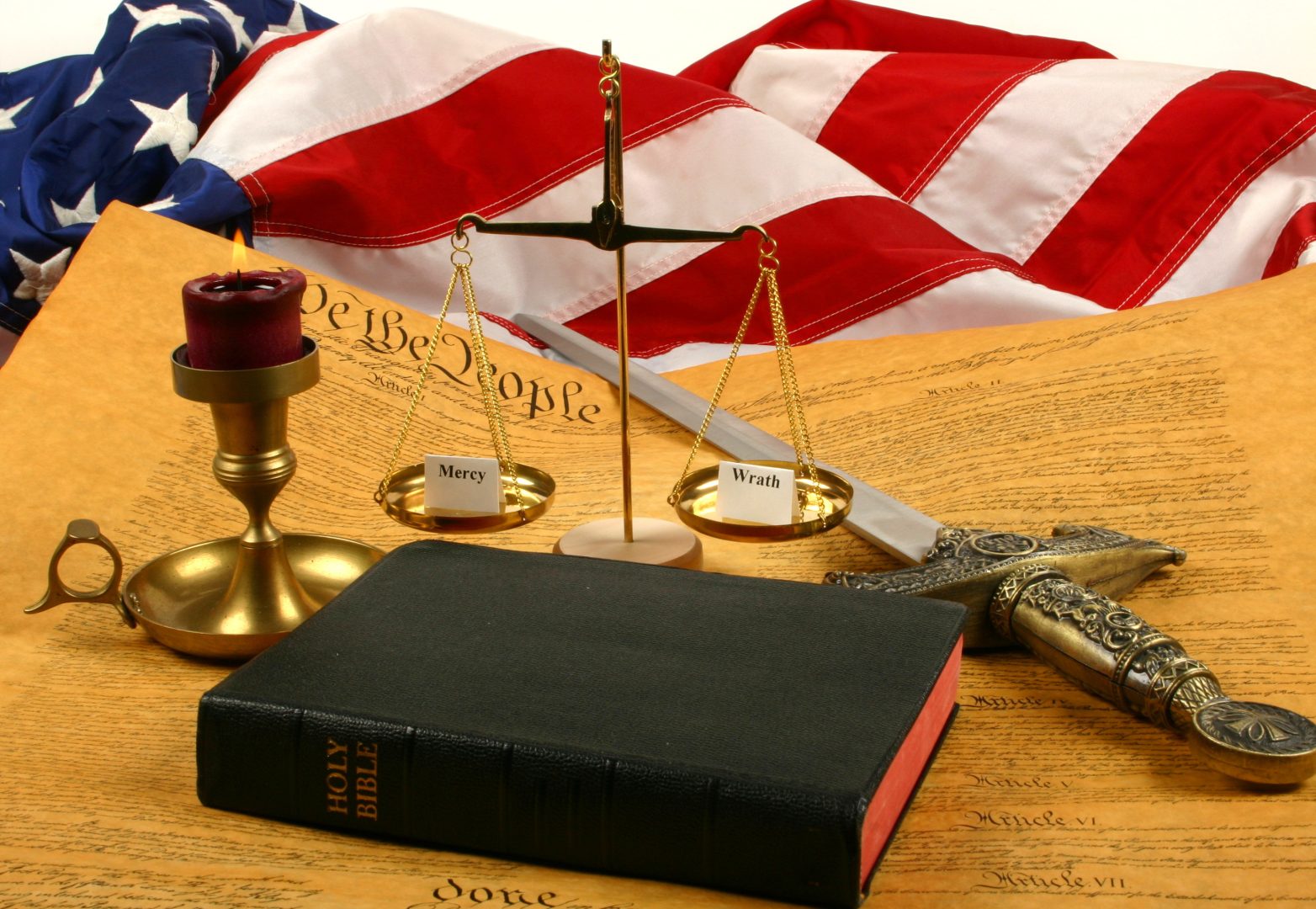


Get a free copy of Parental Rights & Education when you subscribe to our newsletter!

“American civil religion and Christianity are not necessarily at odds with each other. However, like patriotism or nationalism, civil religion for the Christian must take its rightful, assigned place on the list of our priorities, beneath our allegiance to God, the practice of our one true religion, Christianity, and the exercise of our Christian duties to God and man.”
–WILLIAM WOLFE
In our increasingly secular society, Christianity gets a bad rap. Religion in general is less and less welcome in the town square. But as I’ve argued elsewhere, you can’t ever truly vacuum religion out of society. We were made to worship, and worship we will. Laws enforce a moral vision, and so they will enforce someone’s moral vision, good or bad.
What I want to consider, however, is whether or not our historic American civil religion is compatible with Christianity. Are they friends or foes?
My argument here is that American civil religion is not necessarily at odds with Christianity, emphasis, mind you, on the necessarily.
At its best, civil religion can serve as a transcendent, unifying element of a nation’s culture and civic life. As theologian and historian Dr. John Wilsey has defined it, civil religion is “A set of practices, symbols, and beliefs — distinct from traditional religion — that provide a transcendent paradigm around which the citizenry can unite.”
According to Enlightenment thinker Jean-Jacques Rousseau, civil religion was a part of the social contract, a part of the general will. Civil religion was a key piece for embodying the people as a national organism, for forming the majority, and those within it (as well as the “outlaws”). Alexis de Tocqueville also saw civil religion as necessary for liberty. And in America, he saw conditions for a vibrant civil religion, made up of symbols, sources, traditions, and even sacred scriptures.
In America, those “sacred scriptures” of our civil religion trace back to the foundation of the country, including the Declaration of Independence, the Constitution (and preamble), and particularly the Bill of Rights. These are aspirational as well as procedural documents. The corpus of civil religion has been built out over time, arguably including other items such as George Washington’s farewell address, the Monroe Doctrine, the Gettysburg Address, Lincoln’s Second Inaugural, the Emancipation Proclamation, and so forth.
In the American civil religion, our symbols include the flag, the Capitol, our monuments, and even our land, especially the National Parks. And, largely, the ideas from our American civil religion draw from virtuous wells, including historic Protestant Christianity. Again, all of these elements, and the celebration of what they are and how they contribute to our nation, are not necessarily at odds with Christianity.
However, Wilsey also provides a five-fold test for the practice of civil religion (or American exceptionalism) to ensure that it doesn’t ever rise to the level of replacing Christianity or threatening the Gospel. He writes:
“Exceptionalism does not necessarily come into conflict with the Christian gospel. But when expressed and understood in strongly providential terms, it involves at least five theological themes imported from Protestant Christian theology and applied to America: (1) chosen nation, (2) divine commission, (3) innocence, (4) sacred land, and (5) glory.
When exceptionalism relies on these themes, then the idea is in conflict with the Christian gospel. This kind of exceptionalism should be rejected because it potentially makes America an object of worship, bestowing a transcendent status upon it. And it sets America up as a necessary player in redemption history. From a Biblical standpoint, this soteriological form of American exceptionalism paves the way toward heterodoxy at best, heresy and idolatry at worst.”
Where might we see these wrong views of civil religion in practice? Consider the first one: Claiming that America is a particularly chosen nation or that we are under a special election of God.
Historian Conrad Cherry argues that “the history of the American civil religion is a history of the conviction that the American people are God’s New Israel, his newly chosen people…elected by God for a special destiny” and that this belief has been evident in “the focus of American sacred ceremonies, the inaugural addresses of our presidents, the sacred scriptures of our civil religion.”
This is going too far; America is not the “new Israel” — the Church is.
One good example of making civil religion sound almost salvific is President John F. Kennedy’s inaugural address. He references God in such a way as to not contradict Christian notions of God, weaving the transcendent nature of a “God blessing America” into his address in such a way as to appeal to Jews and Protestants along with Catholics. If you try to find a passage that is ‘anti-Biblical’ in his address it will be hard to do, but he never clearly explains the Gospel or calls the American people to the greatest religious good — repenting of their sins and believing in Jesus Christ.
Therefore, from a theological perspective, in order for American civil religion to operate in peaceable cooperation with— and not at odds with — Christianity, two standards must be met.
First, the content and practice of the civil religion — that which it honors, reveres, and holds out as unifying and praiseworthy, and then the manner in which it calls citizens to participate — must fall within the bounds of Christian ethics and values.
Put differently, it must meet the Philippians 4:8 test: “Finally, brothers and sisters, whatever is true, whatever is noble, whatever is right, whatever is pure, whatever is lovely, whatever is admirable—if anything is excellent or praiseworthy—think about such things.”
For example, if “gay pride” becomes a core value of American civil religion (as it seems to have become already), and the nation is called to celebrate homosexuality with perverse displays, then it sets itself at odds with Christianity.
The second standard for the Christian, along with the content and the manner of celebration, is that at no point does participation in American civil religion rise to an idolatrous level. For example, our civil religion encourages us to sing the National Anthem (a good thing) in a respectful manner (also appropriate). But if we are told that by singing the National Anthem, we are pledging our loyalty to the nation above all else, even God, then the civil religion has become idolatrous.
In Exodus 20:2-3, God gives His people the first commandment, telling them, “I am the Lord your God, who brought you out of Egypt, out of the land of slavery. You shall have no other gods before me.” And in Deuteronomy 6:4, God reminds the Israelites to “Hear, O Israel: The Lord our God, the Lord is one. Love the Lord your God with all your heart and with all your soul and with all your strength.”
In conclusion, I stand in the same place in which I started: No, American civil religion and Christianity are not necessarily at odds with each other. However, like patriotism or nationalism, civil religion for the Christian must take its rightful, assigned place on the list of our priorities, beneath our allegiance to God, the practice of our one true religion, Christianity, and the exercise of our Christian duties to God and man.
Follow William on Twitter! @William_E_Wolfe
Ready to dive deeper into the intersection of faith and policy? Head over to our Theology of Politics series page where we’ve published several long-form pieces that will help Christians navigate where their faith should direct them on political issues.

Notifications